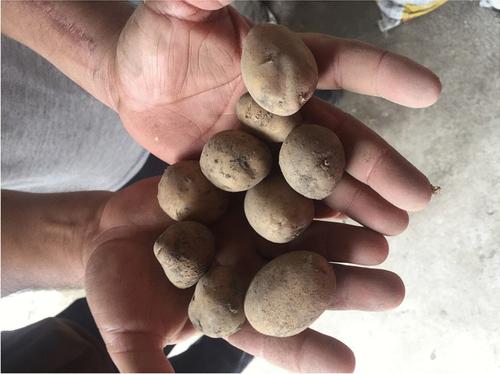Agronomy for Sustainable Development ( IF 7.3 ) Pub Date : 2022-11-08 , DOI: 10.1007/s13593-022-00840-1 Israel Navarrete , Victoria López , Jorge L. Andrade-Piedra , Conny J. M. Almekinders , Peter Kromann , Paul C. Struik

|
Potato production in low-income countries is threatened by seed degeneration, i.e., the accumulation of seed-borne diseases and pests in potato seed tubers when these are vegetatively propagated over consecutive cycles, leading to a reduction in seed quality and yielding ability. Agroecological settings and seed recycling (on-farm propagation over consecutive cycles) determine the process of seed degeneration. However, it is poorly understood how these factors affect this process. Therefore, to reduce this knowledge gap, we analysed two datasets collected in Ecuador, one from a multi-annual field experiment and one from a farmers’ seed study. The experiment, carried out from 2013 to 2016, aimed to assess seed degeneration at agroecological settings present in three different altitudes. The farmers’ seed study, in which 260 farmers were surveyed in 2018, aimed to understand potato seed degeneration in farmers’ fields under diverse agroecological settings. Our results of the multi-annual field experiment showed that agroecological settings have a heterogeneous influence on the presence of seed-borne diseases and pests. We also found that both the agroecological settings at the three altitudes and the number of on-farm propagation cycles affected the rates at which seed-borne diseases and pests on the seeds increased and yield decreased. However, the farmers’ seed study challenged these results by indicating that this was not clear on farms. Combining these results, this article shows that agroecological settings and seed recycling only partially explain the process of seed degeneration. This suggests that more research about seed degeneration needs to also take place under farmers’ conditions to fully understand the complex of potato performance factors. We expect that such research will support the design of improved seed interventions, while simultaneously it may generate discussion about when potato seed degeneration plays an important role in productivity.
中文翻译:

农业生态环境和种子回收仅部分导致厄瓜多尔马铃薯种子退化
低收入国家的马铃薯生产受到种子退化的威胁,即在连续循环无性繁殖时,马铃薯种子块茎中种传病虫害的积累,导致种子质量和产量下降。农业生态环境和种子循环(连续循环的农场繁殖)决定了种子退化的过程。然而,人们对这些因素如何影响这一过程知之甚少。因此,为了缩小这种知识差距,我们分析了在厄瓜多尔收集的两个数据集,一个来自多年的田间试验,另一个来自农民的种子研究。该实验于 2013 年至 2016 年进行,旨在评估三个不同海拔高度的农业生态环境中的种子退化情况。农民种子研究,2018 年对 260 名农民进行了调查,旨在了解不同农业生态环境下农民田间的马铃薯种子退化情况。我们的多年田间试验结果表明,农业生态环境对种传病虫害的存在具有不同的影响。我们还发现,三个海拔高度的农业生态环境和农场繁殖周期的数量都会影响种子传播的病虫害增加和产量下降的速度。然而,农民的种子研究对这些结果提出了挑战,表明这在农场上并不明确。结合这些结果,本文表明农业生态环境和种子循环只能部分解释种子退化的过程。这表明还需要在农民条件下进行更多关于种子退化的研究,以充分了解马铃薯性能因素的复杂性。我们预计此类研究将支持改进种子干预措施的设计,同时它可能会引发关于马铃薯种子退化何时在生产力中发挥重要作用的讨论。



























 京公网安备 11010802027423号
京公网安备 11010802027423号